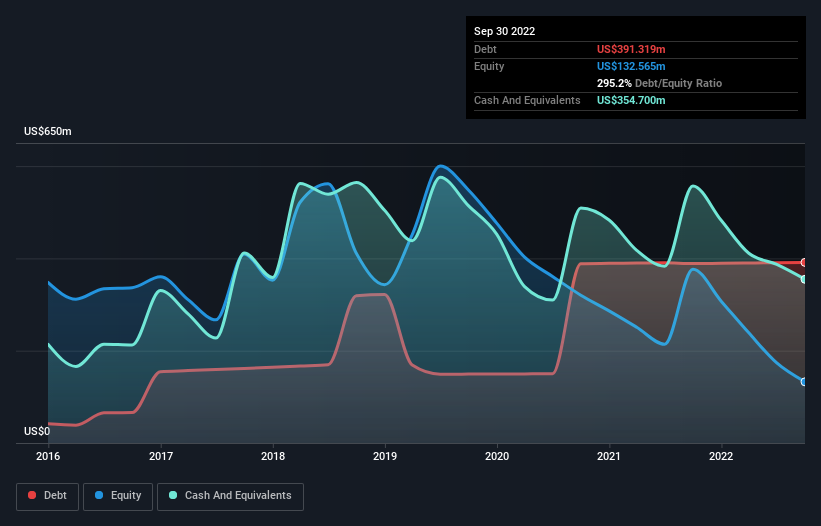- United States
- /
- Biotech
- /
- NasdaqGM:FOLD
We Think Amicus Therapeutics (NASDAQ:FOLD) Has A Fair Chunk Of Debt
Some say volatility, rather than debt, is the best way to think about risk as an investor, but Warren Buffett famously said that 'Volatility is far from synonymous with risk.' It's only natural to consider a company's balance sheet when you examine how risky it is, since debt is often involved when a business collapses. We can see that Amicus Therapeutics, Inc. (NASDAQ:FOLD) does use debt in its business. But the more important question is: how much risk is that debt creating?
When Is Debt A Problem?
Debt is a tool to help businesses grow, but if a business is incapable of paying off its lenders, then it exists at their mercy. In the worst case scenario, a company can go bankrupt if it cannot pay its creditors. While that is not too common, we often do see indebted companies permanently diluting shareholders because lenders force them to raise capital at a distressed price. By replacing dilution, though, debt can be an extremely good tool for businesses that need capital to invest in growth at high rates of return. The first thing to do when considering how much debt a business uses is to look at its cash and debt together.
Our analysis indicates that FOLD is potentially undervalued!
How Much Debt Does Amicus Therapeutics Carry?
As you can see below, Amicus Therapeutics had US$391.3m of debt, at September 2022, which is about the same as the year before. You can click the chart for greater detail. However, because it has a cash reserve of US$354.7m, its net debt is less, at about US$36.6m.

How Strong Is Amicus Therapeutics' Balance Sheet?
According to the last reported balance sheet, Amicus Therapeutics had liabilities of US$164.7m due within 12 months, and liabilities of US$462.3m due beyond 12 months. Offsetting this, it had US$354.7m in cash and US$52.3m in receivables that were due within 12 months. So its liabilities outweigh the sum of its cash and (near-term) receivables by US$220.0m.
Of course, Amicus Therapeutics has a market capitalization of US$3.48b, so these liabilities are probably manageable. But there are sufficient liabilities that we would certainly recommend shareholders continue to monitor the balance sheet, going forward. But either way, Amicus Therapeutics has virtually no net debt, so it's fair to say it does not have a heavy debt load! There's no doubt that we learn most about debt from the balance sheet. But it is future earnings, more than anything, that will determine Amicus Therapeutics's ability to maintain a healthy balance sheet going forward. So if you're focused on the future you can check out this free report showing analyst profit forecasts.
In the last year Amicus Therapeutics wasn't profitable at an EBIT level, but managed to grow its revenue by 10.0%, to US$323m. That rate of growth is a bit slow for our taste, but it takes all types to make a world.
Caveat Emptor
Importantly, Amicus Therapeutics had an earnings before interest and tax (EBIT) loss over the last year. To be specific the EBIT loss came in at US$234m. Considering that alongside the liabilities mentioned above does not give us much confidence that company should be using so much debt. Quite frankly we think the balance sheet is far from match-fit, although it could be improved with time. However, it doesn't help that it burned through US$159m of cash over the last year. So to be blunt we think it is risky. When analysing debt levels, the balance sheet is the obvious place to start. However, not all investment risk resides within the balance sheet - far from it. For example, we've discovered 1 warning sign for Amicus Therapeutics that you should be aware of before investing here.
Of course, if you're the type of investor who prefers buying stocks without the burden of debt, then don't hesitate to discover our exclusive list of net cash growth stocks, today.
New: Manage All Your Stock Portfolios in One Place
We've created the ultimate portfolio companion for stock investors, and it's free.
• Connect an unlimited number of Portfolios and see your total in one currency
• Be alerted to new Warning Signs or Risks via email or mobile
• Track the Fair Value of your stocks
Have feedback on this article? Concerned about the content? Get in touch with us directly. Alternatively, email editorial-team (at) simplywallst.com.
This article by Simply Wall St is general in nature. We provide commentary based on historical data and analyst forecasts only using an unbiased methodology and our articles are not intended to be financial advice. It does not constitute a recommendation to buy or sell any stock, and does not take account of your objectives, or your financial situation. We aim to bring you long-term focused analysis driven by fundamental data. Note that our analysis may not factor in the latest price-sensitive company announcements or qualitative material. Simply Wall St has no position in any stocks mentioned.
About NasdaqGM:FOLD
Amicus Therapeutics
A biotechnology company, focuses on discovering, developing, and delivering novel medicines for rare diseases in the United States and internationally.
Undervalued with reasonable growth potential.
Similar Companies
Market Insights
Community Narratives



